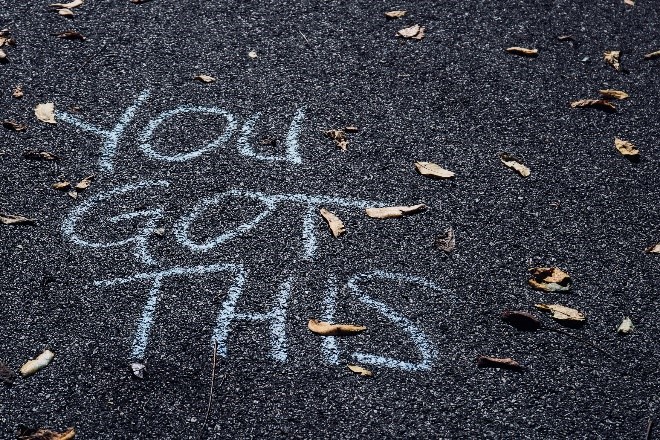Confidence is an enigma for many of us. We know it can help us in many ways. And we hold it in high regard, knowing it can make a big difference.
Yet we tend to view it as something innate–something some people have and others don’t.
The truth is that, while some people have more of a disposition toward confidence than others, it’s something we can all build systematically.
And we should.
Why? When we’re confident, we have conviction that we can succeed.
Contrary to what many people believe, confidence isn’t a fixed trait. We’re not either born with it or missing it. We can acquire confidence and build it over time. As we improve and develop mastery, we build confidence.
Our confidence can go up and down, and we can have high confidence in some areas and low confidence in others.
The Good Kind of Confidence
Note that we don’t want confidence for its own sake–confidence without the merits that cause us to earn it. What we really want is a realistic appraisal of our abilities so that we have an appropriate measure of confidence to match our abilities. And we want to build our confidence over time by improving our abilities and performance.
Confidence isn’t the same as arrogance. Arrogance is an attitude of superiority. When we’re arrogant, we exaggerate our importance. And confidence is certainly not narcissism (when we’re so absorbed in our own life that we ignore the needs of others around us).
Many people struggle with low confidence, for many reasons, including tough life experiences, temperament, cultural background, and more.
When we have low confidence, we pay a price, including: missing out on new opportunities, not stepping into our true power, and lowering our chances for success.
The Benefits of Confidence
“Your success will be determined by your own confidence and fortitude.”
-Michelle Obama, attorney, author, and former First Lady

Confidence has all sorts of benefits. For example, confidence can:
- help improve our health and wellbeing
- boost happiness, joy, and peace of mind
- increase our chance of success in work and/or school
- reduce fear and anxiety
- boost attractiveness
- help us remain open to learning and growing
- increase motivation to continue practicing in pursuit of goals
- help us gain credibility
- increase our ability to make a strong first impression, put others at ease, and influence others
- help us be more open to trying new things
- lead to healthier relationships
- help us develop greater resilience and our ability to perform well under pressure
- increase our leadership capacity and effectiveness as well as executive presence, since followers tend to respond better to confident leaders
- boost creativity and increase our willingness to take creative chances
Of course, confidence isn’t enough to set us up for success. We also need preparation, skill, effort, experience, resources, creativity, strategy, creativity, persistence, and even good luck sometimes. But without confidence, we may decline to begin or try. In that sense, confidence is essential for success over the long haul.

Take the Traps Test
We all fall into traps in life. Sometimes we’re not even aware of it, and we can’t get out of traps we don’t know we’re in. Evaluate yourself with our Traps Test.
How to Build Confidence

“Self-confidence can be learned, practiced, and mastered—just like any other skill.
Once you master it, everything in your life will change for the better.”
-Barrie Davenport, author
Now that we know confidence is pliable, not fixed, and that it comes with so many important benefits, the next question is: How do we build it?
There are many things we can do to build confidence, including:
- focus more on areas of our capability and achievement, and less on areas of weakness and struggle
- set and meet goals that lead to personal and professional accomplishments
- switch off negative self-talk, self-criticism, and limiting beliefs
- swap in positive thoughts for negative ones
- face our fears and in the process build a sense of agency and capability
- stop the unhealthy practice of comparing ourselves to others (and consider taking a break from social media, which tees up unrealistic comparisons)
- continue learning, growing, developing, and building new capacities—working on areas where skills aren’t yet up to standards
- engage in consistent self-care practices, since these give us grounding and energy
- speak up for ourselves (self-advocacy)
- stop thinking in terms of fixed traits (e.g., “I’ve always been bad at math” or “I’m not a confident person”) and start thinking in terms of different people with different interests, skills, and abilities—along with a growth mindset (noting that we can all develop our intelligence, abilities, and talents)
- think about a time when we felt high confidence and ask how we’d act if we were feeling that way now
There are certainly other things we can do in addition to those noted above, and some of them vary by person or situation. For example, some people can use good posture and even “power poses” to boost confidence (see Amy Cuddy’s TED talk about this).
For others, it helps to dress in ways that can boost confidence, to visualize success, or to use affirmations about our dreams and capabilities. We’re wise to experiment and find out what works best for us.
“Inaction breeds doubt and fear. Action breeds confidence and courage.
If you want to conquer fear, do not sit home and think about it.
Go out and get busy.”
-Dale Carnegie
What Confident People Do
When we feel confident, we act differently, and that novel behavior can lead to dramatically different outcomes. For example, confident people tend to:
- make decisions more quickly
- maintain optimism
- take risks
- admit mistakes
- accept responsibility for choices and actions
- avoid the trap of blaming others
- celebrate others’ successes
- experience fewer instances of envy and jealousy
- laugh at themselves without beating themselves up, which can be endearing
- accept compliments, instead of awkwardly deflecting them

Quality of Life Assessment
Evaluate your quality of life in ten key areas by taking our assessment. Discover your strongest areas, and the areas that need work, then act accordingly.
On Leadership and Confidence and Self-Efficacy
Confidence can contribute significantly to leader effectiveness, but especially when we have realistic perceptions of our effectiveness. Self-awareness is essential.
Unfortunately, many leaders are overconfident about their leadership abilities. According to researchers (Leanne Atwater and Francis Yammarino), this leads to many problems, including: unrealistic optimism, dismissal of criticism, blindness to flaws, lack of effort made to overcome weaknesses, and even narcissism.
By contrast, when leaders have good self-awareness and agree with the ratings of their followers, they’re better candidates for promotion and less likely to struggle with leadership derailers.
According to research by Bandura (1997) and by Luthans and Avolio (2003), confident leaders are more likely to welcome a challenge, to persist when they encounter obstacles, and to succeed.
Final Thoughts
We’ve seen that confidence has many important benefits—and that we have much more agency over our confidence levels than most people think. So why not engage in regular practices that will boost our confidence while uplifting our mental state and our ability to succeed and make positive impacts in the world?
“With realization of one’s own potential and self-confidence
in one’s ability, one can build a better world.”
-The 14th Dalai Lama, Tenzin Gyatso

Reflection Questions
- Do you currently feel confident about the areas that matter most to you now?
- In what areas would you like to build your confidence?
- What will you do, starting today, to build your confidence in certain areas?
Wishing you well with it, and let me know if I can help.

– Gregg Vanourek
Tools for You
- Traps Test (Common Traps of Living) to help you identify what’s getting in the way of your happiness and quality of life
- Quality of Life Assessment so you can discover your strongest areas and the areas that need work, then act accordingly.
- Personal Values Exercise to help you clarify what’s most important to you
Postscript: Inspirations on Confidence
- “Man often becomes what he believes himself to be. If I keep on saying to myself that I cannot do a certain thing, it is possible that I may end by really becoming incapable of doing it. On the contrary, if I have the belief that I can do it, I shall surely acquire the capacity to do it even if I may not have it at the beginning.” -Mahatma Gandhi
- “Self-confidence is the first requisite to great undertakings.” -Samuel Johnson
- “Believe in yourself! Have faith in your abilities! Without a humble but reasonable confidence in your own powers you cannot be successful or happy.” -Norman Vincent Peale
- “One important key to success is self-confidence. An important key to self-confidence is preparation.” -Arthur Ashe
- “Confidence doesn’t come out of nowhere. It’s a result of something … hours and days and weeks and years of constant work and dedication.” -Roger Staubach, former professional football player
- “With confidence, you have won before you have started.” -Marcus Garvey
- “When you have confidence, you can have a lot of fun. And when you have fun, you can do amazing things.” -Joe Namath, legendary quarterback
- “As soon as you trust yourself, you will know how to live.” -Johann Wolfgang von Goethe
- “People who ask confidently get more than those who are hesitant and uncertain. When you’ve figured out what you want to ask for, do it with certainty, boldness, and confidence.” -Jack Canfield
- “If you hear a voice within you say ‘you cannot paint,’ then by all means paint, and that voice will be silenced.” -Vincent Van Gogh
- “Argue for your limitations, and sure enough they’re yours.” -Richard Bach, writer
- “If I have lost confidence in myself, I have the universe against me.” -Ralph Waldo Emerson
- “If you have no confidence in self, you are twice defeated in the race of life. With confidence, you have won even before you have started.” -Cicero

Gregg Vanourek’s Newsletter
Join our rapidly growing community. Sign up now and get monthly inspirations (new articles, opportunities, and resources). Welcome!
++++++++++++++++++++++++++++++
Gregg Vanourek is a writer, teacher, TEDx speaker, and coach on leadership and personal development. He is co-author of three books, including LIFE Entrepreneurs: Ordinary People Creating Extraordinary Lives (a manifesto for integrating our life and work with purpose, passion, and contribution) and Triple Crown Leadership: Building Excellent, Ethical, and Enduring Organizations (a winner of the International Book Awards). Check out his Best Articles or get his monthly newsletter. If you found value in this article, please forward it to a friend. Every little bit helps!


2 thoughts on “How to Build Confidence in Yourself and Your Leadership”
A fast and easy way to build confidence is taking an inventory of what you’ve accomplished, then, reminding yourself. Also, using the tips above to keep building it. Remember … building confidence is an ongoing process. Get my book, “It’s Time to Brag!” (business) or “The Secret to Selling Yourself Anytime, Anywhere: Start Bragging!” https://SeibCo.com/books/
Thanks for sharing these good tips–and your books–Jeannette!